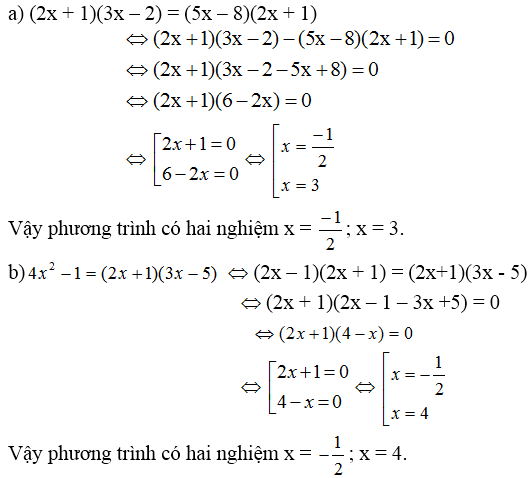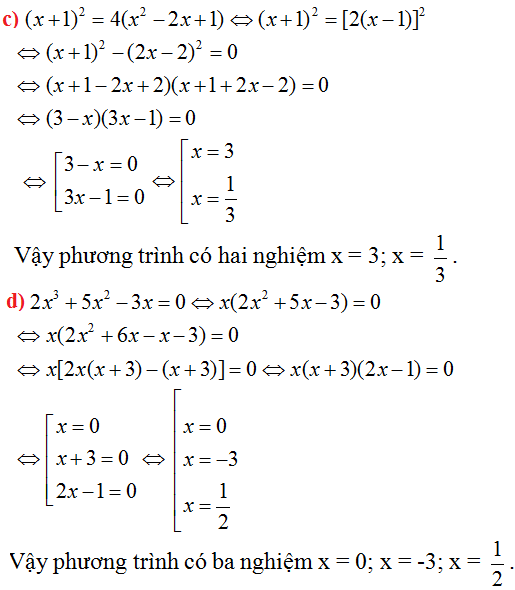
Hãy nhập câu hỏi của bạn vào đây, nếu là tài khoản VIP, bạn sẽ được ưu tiên trả lời.


pt <=>(x^5+x^4)+(x^4+x^3)+(2x^3+2x^2)+(x^1+x)+(x+1) =0
<=> (x+1).(x^4+x^3+2x^2+x+1)=0
<=>(x+1).[(x^4+x^3+x^2)+(x^2+x+1)] =0
<=>(x+1).(x^2+x+1).(x^2+1)=0
<=> x+1 = 0 ( vì x^2+x+1 và x^2+1 đều > 0)
<=> x= -1
Vậy pt có tập nghiệm x=-1

a/ Đơn giản, phân tích mẫu số thứ 3 thành nhân tử rồi quy đồng, ko có gì khó cả, chắc bạn tự làm được
b/ Đặt \(\left(x+1\right)^2=t\ge0\)
\(\frac{t+6}{t+2}=t+3\Leftrightarrow t+6=\left(t+2\right)\left(t+3\right)\)
\(\Leftrightarrow t^2+4t=0\Rightarrow\orbr{\begin{cases}t=0\\t=-4\left(l\right)\end{cases}}\) \(\Rightarrow x=-1\)
c/ ĐKXĐ: bla bla bla...
Nhận thây \(x=0\) không phải nghiệm, phương trình tương đương:
\(\frac{2}{3x+\frac{2}{x}-1}-\frac{7}{3x+\frac{2}{x}+5}=1\)
Đặt \(3x+\frac{2}{x}-1=t\)
\(\frac{2}{t}-\frac{7}{t+6}=1\)
\(\Leftrightarrow2\left(t+6\right)-7t=t\left(t+6\right)\)
\(\Leftrightarrow t^2+11t-12=0\Rightarrow\orbr{\begin{cases}t=1\\t=-12\end{cases}}\)
\(\Rightarrow\orbr{\begin{cases}3x+\frac{2}{x}-1=1\\3x+\frac{2}{x}-1=-12\end{cases}}\) \(\Rightarrow\orbr{\begin{cases}3x^2-2x+2=0\\3x^2+11x+2=0\end{cases}}\)
Bấm máy

a)(2x+1)(3x-2)=(5x-8)(2x+1)
⇔(2x+1)(3x-2)-(5x-8)(2x+1)=0
⇔(2x+1)(3x-2-5x+8)=0
⇔(2x+1)(-2x+6)=0
⇔2x+1=0 hoặc -2x+6=0
1.2x+1=0⇔2x=-1⇔x=-1/2
2.-2x+6=0⇔-2x=-6⇔x=3
phương trình có 2 nghiệm x=-1/2 và x=3

a) 4 ( x + 5 )( x + 6 )( x + 10 )( x + 12 ) = 3x2
Do x = 0 không là nghiệm pt nên chia 2 vế pt cho \(x^2\ne0\), ta được :
\(\frac{4}{x^2}\left(x^2+60+17x\right)\left(x^2+60+16x\right)=3\)
\(\Leftrightarrow4\left(x+\frac{60}{x}+17\right)\left(x+\frac{60}{x}+16\right)=3\)
Đến đây ta đặt \(x+\frac{60}{x}+16=t\left(1\right)\)
Ta được :
\(4t\left(t+1\right)=3\Leftrightarrow4t^2+4t-3=0\Leftrightarrow\left(2t+3\right)\left(2t-1\right)=0\)
Từ đó ta lắp vào ( 1 ) tính được x

a) <=> \(6x^2-5x+3-2x+3x\left(3-2x\right)=0\)
<=> \(6x^2-5x+3-2x+9x-6x^2=0\)
<=> \(2x+3=0\)
<=> \(x=\frac{-3}{2}\)
b) <=> \(10\left(x-4\right)-2\left(3+2x\right)=20x+4\left(1-x\right)\)
<=> \(10x-40-6-4x=20x+4-4x\)
<=> \(6x-46-16x-4=0\)
<=> \(-10x-50=0\)
<=> \(-10\left(x+5\right)=0\)
<=> \(x+5=0\)
<=> \(x=-5\)
c) <=> \(8x+3\left(3x-5\right)=18\left(2x-1\right)-14\)
<=> \(8x+9x-15=36x-18-14\)
<=> \(8x+9x-36x=+15-18-14\)
<=> \(-19x=-14\)
<=> \(x=\frac{14}{19}\)
d) <=>\(2\left(6x+5\right)-10x-3=8x+2\left(2x+1\right)\)
<=> \(12x+10-10x-3=8x+4x+2\)
<=> \(2x-7=12x+2\)
<=> \(2x-12x=7+2\)
<=> \(-10x=9\)
<=> \(x=\frac{-9}{10}\)
e) <=> \(x^2-16-6x+4=\left(x-4\right)^2\)
<=> \(x^2-6x-12-\left(x-4^2\right)=0\)
<=> \(x^2-6x-12-\left(x^2-8x+16\right)=0\)
<=> \(x^2-6x-12-x^2+8x-16=0\)
<=> \(2x-28=0\)
<=> \(2\left(x-14\right)=0\)
<=> x-14=0
<=> x=14

a) \(x^3+x^2+2x-16\ge0\)
\(\Leftrightarrow x^3-2x^2+3x^2-6x+8x-16\ge0\)
\(\Leftrightarrow\left(x-2\right)\left(x^2+3x+8\right)\ge0\)
Mà \(x^2+3x+8>x^2+3x+2,25=\left(x+1,5\right)^2\ge0\)
Cho nên \(x-2\ge0\)
\(\Leftrightarrow x\ge2\)
a,x^3-2x^2+3x^2-6x+8x-16>=0
(x^2+3x+8)(x-2)>=0
x^2+3x+8>0
=> để lớn hơn hoac bang 0 thì x-2 phải>=0
=>x>=2
b,hình như là vô nghiệm ko chắc chắn lắm

\(\Leftrightarrow\frac{5\left(x+5\right)-3\left(x-3\right)}{15}=\frac{5\left(x+5\right)-3\left(x-3\right)}{\left(x-3\right)\left(x+5\right)}\)
\(\Leftrightarrow\frac{2x+34}{15}=\frac{2x+34}{x^2+2x-15}\Leftrightarrow\orbr{\begin{cases}2x+34=0\\x^2+2x-15=15\end{cases}}\)
\(\Leftrightarrow\orbr{\begin{cases}x=-17\\x^2+2x-30=0\end{cases}}\)
Từ đó tìm được \(S=\left\{-17;\sqrt{31}-1;-\sqrt{31}-1\right\}\)


Milky Way trả lời được này. Giải nhé ??? ^^